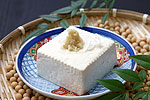 We come now, in this multi-part series on lowering cholesterol (see the previous article, This Rice Could Combat Cholesterol), to another great natural remedy. This one comes in food and supplement form. Everyone just has to realize that, when it comes to health, soy is not just for vegetarians. It could help you lower cholesterol, for starters.
We come now, in this multi-part series on lowering cholesterol (see the previous article, This Rice Could Combat Cholesterol), to another great natural remedy. This one comes in food and supplement form. Everyone just has to realize that, when it comes to health, soy is not just for vegetarians. It could help you lower cholesterol, for starters.
The cholesterol-lowering effect of soy protein, in sharp contrast to animal protein, has been recognized in animal studies for over 90 years. However, in human studies, the results have not been consistent. The following summarizes the key findings from four recent studies:
In a meta-analysis of 38 studies in which the intake of energy, fat, saturated fat and cholesterol was comparable, subjects either ate a control diet or soy-containing diets. With an average intake of 47 g a day of soy protein, the results were: total cholesterol dropped 9.3%; LDL (bad) cholesterol dropped 13%; and triglycerides dropped 10.5%. The worse off your cholesterol levels were, the better soy protein acted in reducing them.
In a meta-analysis of eight studies, the effects of high (96 mg a day) or low (approximately six mg a day) isoflavone levels were studied. Isoflavones are the main acting substance in soy. All participants consumed similar amounts of dietary fat, cholesterol, and fiber. The results were impressive. LDL cholesterol in those taking 50 g a day of soy with high isoflavone content reduced 5.8 mg/dL more than those on low isoflavone content. LDL cholesterol dropped more in patients with high cholesterol than in those with normal levels. The following foods would yield approximately 90 mg a day of isoflavone: two glasses of soy milk; two packs of fermented soybeans; one block of tofu; or 249 grams of miso (fermented soybean paste).
In a meta-analysis of 26 studies conducted among adults given either soy protein or isoflavones, the researchers concluded that the cholesterol-lowering effects were small and clinically insignificant.
In a meta-analysis of 11 randomized controlled trials among adults, the effects of soy isoflavones on serum lipids were examined. The soy isoflavones lowered total cholesterol by 1.77% and dropped LDL cholesterol by 3.58%, while soy-protein-enriched isoflavones significantly reduced LDL cholesterol by 4.98% and boosted HDL (good) cholesterol by three percent. Those who had higher cholesterol levels at the start gained greater benefits.
Let’s compare soy with statin drugs, which are used to treat high cholesterol:
Statin Drugs: Lower LDL levels 18% to 55%; raise HDL levels five percent to 15%; lower triglycerides seven percent to 30%
Soy: Lower LDL levels 3.6% to 13%; raise HDL levels 30%; lower triglycerides 11%
It seems soy is worth it for those who need to better manage their cholesterol.
Sources:
Anderson, J.W., et al., “New Engl. J. Med., 1995; 333: 276-
82.
Zhuo, X.G., et al., “Soy Isoflavone Intake Lowers Serum
LDL Cholesterol: A Meta-Analysis of 8 Randomized
Controlled Trials in Humans,” J. Nutr., 2004; 134: 2,395-
2,400.
Dewell, A., et al., “A Critical Evaluation of the Role of Soy
Protein and Isoflavone Supplementation in the Control of
Plasma Cholesterol Concentrations,” J. Clin. Endo. Metab.,
2006; 91: 772-80.
Taku, K., et al., “Soy isoflavones lower serum total and
LDL cholesterol in humans: a meta-analysis of 11
randomized controlled trials,” Am. J. Clin. Nutr. 2007;
85: 1,148-56.
